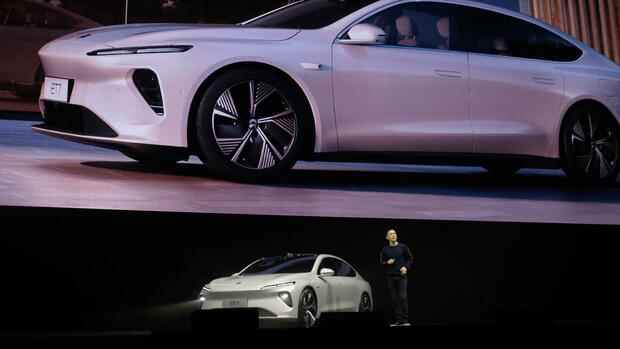Beijing Li Bin looks satisfied. The day before, the founder of China’s e-car hope Nio presented the new ET5 sedan on the big stage. Now Li, who calls himself William Li in English, is talking to journalists in Suzhou, east China, about entering the German market next year.
In an interview with the Handelsblatt and other media, Li announced that the first cars would be offered in Germany “pretty late next year”. In addition, as Li had previously announced, the company also wants to expand to Sweden, Denmark and the Netherlands. The company aims to reach users in more than 25 countries and regions by 2025.
Some consider Nio to be China’s counterpart to the Californian electrical pioneer Tesla. Although the company, which is listed on the New York Stock Exchange, was only founded in 2014, it was already ranked sixth among the best-selling all-electric cars in China in the first ten months of 2021.
According to its own information, Nio delivered a total of 80,940 new vehicles from January to November, almost all of them in China. This corresponds to an increase of more than 120 percent compared to the previous year.
Top jobs of the day
Find the best jobs now and
be notified by email.
This year Nio has already started in Norway. In September the company opened the first sales outlets in the Scandinavian country. Nio does not officially publish any sales figures for individual markets. According to estimates, only 100 to 200 cars have been sold in Norway so far.
Market entry in Germany
When asked, company founder Li does not want to say how many cars Nio wants to sell in Germany. The business plan is still being finalized, he says. At Nio, it’s not just about the vehicles, but also about so-called battery changing stations. Because: One of Nio’s sales arguments in China are precisely these stations.
Instead of charging the batteries in the vehicles, Nio drivers can simply have them replaced at one of the stations within a few minutes. In China, Nio has already installed around 700 of these changeover points. The company is thus above its self-set goal of 500 stations this year. In Norway, Nio plans to install 20 battery exchange stations by the end of next year.
Entering the German market will initially result in additional costs, without it being able to generate profits over the next few years. Zhang Xiang from the Automobil Industry Innovation Center at the North China University of Technology in Beijing believes that Nio is going to Germany to be active in as many markets as possible.
It wants to become an international company. “So if Nio has sales in many countries, no matter how small, it will polish up the facade, drive up the share price and make financing easier,” believes Zhang.
Nio’s expansion into Europe has another reason: China is becoming more and more competitive when it comes to electric vehicles, says Edison Yu, an analyst for China’s mobility industry at Deutsche Bank in New York. “There aren’t nearly as many electric car start-ups in Europe, and the big tech companies aren’t getting into the electric car business as much as they are in China,” said Yu.
According to estimates, there are already around 300 suppliers on the Chinese market for electric cars – and more are being added all the time. In particular, large corporations, which had nothing to do with the industry before, have announced investments worth billions in the past few months in order to start producing their own electric cars.
The smartphone manufacturer Xiaomi, the search engine operator Baidu, China’s Google, and even the heavily indebted real estate developer Evergrande have all entered the business.
Limited sales potential
Nio isn’t the first Chinese electric car company to launch in Europe. Its Shanghai competitor Aiways, Xiaopeng (XPeng) from Guangzhou in the south of China, as well as Lynk & Co, a brand of the largest Chinese private car manufacturer Geely, and the Shenzhen-based car company BYD are also trying their luck on the European market.
Nevertheless, the potential for newcomers like Nio in Germany will initially be limited, says Deutsche Bank analyst Yu. He estimates the lower limit of sales at around 3,000 pieces – similar to Lexus in Germany. The upper limit is 20,000 vehicles, which roughly corresponds to Land Rover sales in this country before the start of the pandemic.
Instead of charging the car’s battery, Nio drivers in China can simply have them exchanged within a few minutes at one of the stations.
(Photo: Reuters)
Nio has had an eventful history. Last year the company was on the verge of bankruptcy and had to be saved with government money. A group of investors led by the state-owned company Hefei City Construction and Investment Holding helped Nio financially with the equivalent of around one billion US dollars. Overall, Nio has comparatively close ties to the Chinese state. It produces its cars together with the state car manufacturer Anhui Jianghuai Automobile (JAC).
According to experts, there were three reasons the company did so badly. Firstly, the pandemic with all its consequences for production and sales and, secondly, a cut in subsidies for electric cars in China. Nio is responsible for the third reason, because the company had taken over with investments.
Since its inception in 2014, Nio has not yet made a profit. “Nio is still a start-up company,” explains Li. “We are still investing a lot in our future, so we cannot make a profit now.”
You are in a healthy and sustainable financial situation, so Li. “We are currently in a situation that is very different from the one in 2019,” said Li. However, he does not want to make a statement about when the company should make a profit .
More: China’s e-car manufacturers are flooding their own market. A comment
